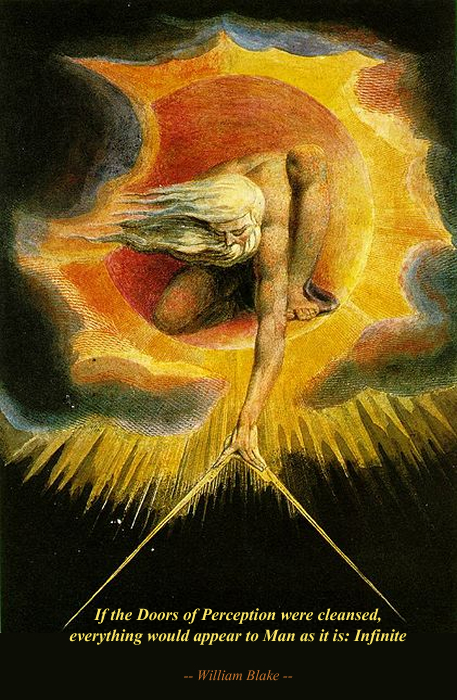Republished by Blog Post Promoter
If the Doors of Perception were cleansed, everything would appear to Man as it is: Infinite
— Word and painting by William Blake —
_______________________________________
William Blake (28 November 1757 – 12 August 1827) was an English poet, painter and printmaker. Largely unrecognised during his lifetime, Blake is now considered a seminal figure in the history of the poetry and visual arts of the Romantic Age. His prophetic poetry has been said to form “what is in proportion to its merits the least read body of poetry in the English language”. His visual artistry led one contemporary art critic to proclaim him “far and away the greatest artist Britain has ever produced”. Considered mad by contemporaries for his idiosyncratic views, Blake is held in high regard by later critics for his expressiveness and creativity, and for the philosophical and mystical undercurrents within his work.
Blake shared Dante’s distrust of materialism and the corruptive nature of power, and clearly relished the opportunity to represent the atmosphere and imagery of Dante’s work pictorially. Even as he seemed to near death, Blake’s central preoccupation was his feverish work on the illustrations to Dante’s Inferno; he is said to have spent one of the very last shillings he possessed on a pencil to continue sketching.
On the day of his death, Blake worked relentlessly on his Dante series. Eventually, it is reported, he ceased working and turned to his wife, who was in tears by his bedside. Beholding her, Blake is said to have cried, “Stay Kate! Keep just as you are – I will draw your portrait – for you have ever been an angel to me.” Having completed this portrait (now lost), Blake laid down his tools and began to sing hymns and verses. At six that evening, after promising his wife that he would be with her always, Blake died. Gilchrist reports that a female lodger in the house, present at his expiration, said, “I have been at the death, not of a man, but of a blessed angel.”
SOURCE: Wikipedia.org

